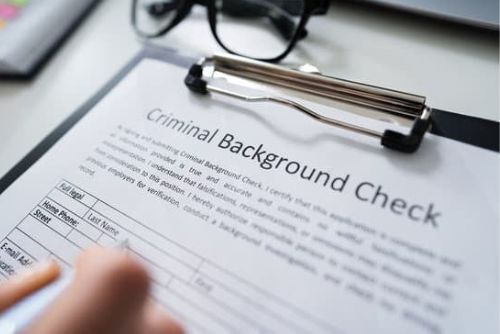What Is A Background Check

What Is A Background Check
As a job seeker, have you ever wondered why employers always request to conduct background checks before offering you a position? Or as an employer, do you know the importance of conducting thorough background checks on potential employees? Well, wonder no more.
In this article, we will explore about what is a background check and why it's essential to both employers and job seekers.
A background check is simply a process that involves verifying information about an individual to determine their suitability for employment or other purposes. It typically involves checking an individual's criminal record, education credentials, work history, credit history, and any other relevant information.
Employers use this process to ensure they are hiring the right candidates who meet their requirements and are not posing any potential risks to their business. As a job seeker, it's important to understand what kind of information may be
obtained from your background check so that you can prepare accordingly.
What Is A Background Check
Do you know what a background check is and why it's important for you?
A background check is an investigation into your personal history, which can include your employment history, educational qualifications, criminal record, financial information, and more. It's an essential tool that employers use to determine if you are a suitable candidate for their organization.
Employers conduct background checks to verify that the information provided by job applicants is accurate. They want to ensure that they hire trustworthy individuals who have the necessary skills and qualifications to perform the job duties effectively. Employers may also conduct criminal background checks to identify any potential red flags that could pose a risk to their company or employees. In today's competitive job market, having a clean record can be crucial in landing your dream job.
Employers want employees who they can trust with sensitive data and confidential information; therefore, it's essential always to be truthful about your past when applying for jobs. Remember always; honesty is still the best policy when going through a background check process.
A thorough employer screening process helps companies maintain high standards of safety and security within their organizations. Therefore, it's vital always to make sure all aspects of your life reflect positively on yourself when seeking employment opportunities as most employers will go through every detail of your application before deciding whether or not you're suitable for the role.
Employer Background Check And Screening

You'll want to know what your potential employer is looking for when they screen candidates. This process is called employer screening, and it involves a thorough background check that verifies your education, work history, and criminal record.
Employers use this information to make informed decisions about who they hire. When it comes to the background check portion of employer screening, employers are mainly looking for any red flags that could indicate dishonesty or untrustworthiness. They want to ensure that you're not hiding anything from them and that you have the qualifications necessary for the job.
If there are discrepancies in your resume or criminal record, this could raise concerns and lead to further investigation. Overall, employer screening is an essential step in the hiring process. It helps employers make informed decisions about who they bring on board while also protecting their business from potential risks.
By understanding what employers look for during a background check, you can better prepare yourself for the hiring process and increase your chances of landing the job. As we move into discussing types of verification, it's important to keep in mind how crucial employer screening is in ensuring a successful hiring process.
Types Of Verification
Now that we've covered employer screening, let's talk about the different ways employers verify your qualifications and credentials to ensure you're the right fit for their team. This process is known as a background check, and it typically includes several types of verification. Here are three examples:
- Employment Verification: This type of background check involves contacting your previous employers to verify your job titles, dates of employment, and reason for leaving. Employers want to make sure you have the experience and skills necessary for the job.
- Education Verification: Employers may also verify your educational background by contacting schools or universities you attended. They want to ensure you have the degree or certification required for the position.
- Criminal Background Check: Finally, many employers will conduct a criminal background check to ensure that you don't have a criminal record that could put their company at risk.
As someone who craves innovation, I find these verification methods fascinating because they show how technology has revolutionized hiring practices in recent years. What used to be a time-consuming and manual process has become streamlined thanks to online databases and automated systems.
Moving forward into our discussion on the pre-employment process, it's important to note that passing these verifications is just one step in securing a job offer.
Pre-Employment Process

Let's dive into the pre-employment process and explore all of the exciting steps that lead up to receiving a job offer! The pre-employment process is crucial for both employers and employees. It helps ensure that the right candidate is hired for the job, while also protecting the company from any potential legal issues down the line.
One important aspect of this process is background screening. This involves verifying a candidate's employment history, education credentials, criminal record, and other relevant information. Employers conduct these screenings to verify that candidates have been truthful in their resumes and applications. This ensures that they are hiring someone with integrity who can be trusted to perform their duties responsibly.
Employment verification is another critical part of the pre-employment process. It involves contacting previous employers to confirm a candidate's work experience and performance. This helps ensure that employers are not only hiring someone who has the skills necessary for the job but also has a track record of success in similar roles. With these checks in place, employers can make informed decisions about who they hire, which ultimately leads to better outcomes for everyone involved.
In conclusion, understanding the pre-employment process and its components, such as background screenings and employment verification, can help us appreciate why it's an essential step before one receives an official offer letter from an employer.
As we move on to discussing background check services, it's important to remember how crucial thoroughness is when assessing prospective employees' backgrounds. These checks help identify red flags early on so that potential issues can be addressed before they become problems at work or pose risks for others' safety in extreme cases (like criminal records).
Background Check Services
When it comes to hiring new employees, it's important to have a reliable service that can provide you with information on their past experiences and qualifications. This is where background check services come in. That's why we should know what is a background check. These services offer various employment screening solutions that help companies make informed decisions about potential hires.
Here are five different types of background check services available:
- Criminal record checks: This type of check is essential for jobs that involve working with vulnerable populations or handling sensitive information. It helps employers identify any past criminal activity.
- Employment verification: This type of check confirms the accuracy of job candidates' previous work history, including dates of employment, job titles, and responsibilities.
- Education verification: Employers want to know if a candidate really earned the degree they claim to have earned. Education verification confirms whether a candidate has attended college or university and obtained the degrees claimed.
- Reference checks: Reference checks involve contacting former employers or other professional contacts provided by the applicant in order to confirm their character, work ethic, and skills.
- Credit history checks: While not always necessary for every job opening, credit history checks can be important when hiring for positions that deal with finances or financial data.
Background check services are an essential tool for businesses looking to hire qualified candidates. They provide valuable insights into a person's past experiences and qualifications.
In the next section, we'll delve deeper into criminal record searches as part of these background check services.
Criminal Records Search In State And Federal Databases

Performing a criminal record search is crucial in identifying any potential red flags in a job candidate's past. It involves searching through various databases to uncover an individual's criminal history, including any convictions or arrests. This information can be used by employers to make informed hiring decisions and ensure the safety of their workplace.
A criminal record search typically involves searching through local, state, and federal databases to uncover any relevant information about an individual's past. This can include details about prior convictions or arrests for crimes such as theft, assault, or drug-related offenses. Employers may also choose to conduct more extensive checks that include fingerprinting or interviews with former employers.
One important thing to keep in mind when conducting a criminal record search is that not all convictions are created equal. Some offenses may be minor infractions that do not pose a significant risk to the workplace, while others may indicate serious character flaws or tendencies towards violence. By carefully considering the specific nature of each offense uncovered during a criminal record search, employers can make informed decisions about whether or not to hire a particular candidate.
When it comes to hiring new employees, it's essential for businesses to conduct thorough background checks that include both criminal record searches and credit and conduct checks. These steps help ensure that companies are making informed decisions based on accurate information about each candidate's past behavior and financial responsibility.
In the following section, we'll explore how credit and conduct checks work and why they are just as important as criminal history searches when it comes to evaluating job candidates.
Credit And Conduct Checks
Now that we've covered criminal record searches, let's move on to another important aspect of a background check: credit and conduct checks. These types of checks are becoming increasingly common as employers seek to ensure that their employees are financially responsible and have a history of ethical behavior.
During a credit check, an employer will review your credit report to see if you have any outstanding debts or financial issues. This can give them insight into your overall financial responsibility and help them determine whether or not you are a good candidate for the position.
A conduct check, on the other hand, looks at your past behavior in the workplace and can include things like contacting previous employers to verify employment history and checking references.
It's important to note that while these types of checks are becoming more common, they are still subject to certain regulations under the Fair Credit Reporting Act (FCRA). This means that employers must follow certain guidelines when conducting these types of checks and must obtain written consent from applicants before doing so.
With all this in mind, it's clear that credit and conduct checks play an important role in modern background screening processes. Moving forward, let's take a closer look at social security verification - another key component of many background checks.
Social Security Verification

You may be surprised to learn that verifying your social security information is a critical step in the hiring process, ensuring that you're who you say you are and protecting both the employer and yourself from potential identity theft or fraud.
During a background check, employers will use your social security number to verify your employment history, confirm your identity, and ensure that you're eligible to work in the United States.
Social security verification is an essential part of any comprehensive background check. It allows employers to confirm that you've provided accurate information about yourself and helps protect them from potential legal issues down the line. Additionally, this verification can help prevent identity theft by ensuring that no one else is using your social security number for fraudulent purposes.
If all goes well during the social security verification process, it's unlikely to have any impact on whether or not you're offered a job. However, if there are discrepancies in the information provided or red flags raised during this portion of the background check, it could result in adverse action procedures being taken against you by the employer.
Adverse Action Procedures
It's important to be aware of adverse action procedures, which could result from discrepancies found during social security verification. Adverse action refers to any negative employment decision, such as not hiring or terminating an employee, based on information obtained through a background check. As an employer, it's crucial to understand and follow the guidelines set forth by the Fair Credit Reporting Act (FCRA) when taking adverse actions.
Here are three sub-lists that describe different aspects of adverse action procedures:
- Notification: If you plan to take adverse action based on information found in a background check, you must provide the applicant or employee with written notice that includes a copy of the report and a summary of their rights under FCRA.
- Timeframe: You must wait a reasonable amount of time after providing notice before taking adverse action. This gives the individual an opportunity to dispute any inaccuracies in the report or provide additional information for consideration.
- Documentation: It's essential to document every step of the adverse action process thoroughly. This includes keeping records of notification and waiting periods, as well as any communication with the individual regarding their report or dispute.
Employment decisions based on background checks can have far-reaching consequences for both employers and employees. By following proper adverse action procedures outlined by FCRA, businesses can ensure they're making informed and fair decisions while protecting themselves from potential legal issues.
Moving forward into discussing different types of checks, it's important to note that each type may require its own unique set of procedures when it comes to conducting background checks and adhering to FCRA guidelines.
Different Types Of Checks

Let's take a closer look at the different types of background checks that employers can use to gather information about their current or potential employees.
The most common type is an employment background check, which looks into an individual's employment history, education, criminal record and other relevant information. This type of screening helps employers verify the accuracy of candidates' resumes and ensure they are hiring trustworthy and qualified individuals.
Another popular type of background check is a credit check. Employers may run a credit check on candidates who will be handling financial transactions or sensitive company information. A credit check provides insight into an individual's financial responsibility, which can be helpful for assessing risk factors associated with certain roles.
There are specialized background checks such as drug testing and social media screenings. Drug testing helps employers ensure that their employees are not using illegal substances while on the job while social media screenings provide insight into how an employee represents themselves online. Employers can use this information to assess whether an individual's online presence aligns with the company culture and values.
With these various types of background checks available, employers have plenty of tools at their disposal to help them make informed hiring decisions. However, it's important to note that each type has its own set of regulations for compliance purposes.
In the next section, we'll take a closer look at one specific type: MVR background checks and how they fit into this broader landscape of screenings for job candidates.
MVR Background Checks
Now, imagine you're an employer who wants to ensure the safety of your employees and company vehicles. One of the most important aspects of this is making sure that the people driving those vehicles have a clean driving record.
This is where MVR background checks come into play. MVR stands for motor vehicle records check, and it's a type of background check that focuses specifically on an individual's driving history. MVR background checks are essential for employers who want to protect their assets and ensure that their employees are safe on the road.
These checks provide information about an individual's driving record, including any accidents they may have been involved in, traffic violations they've received, and whether or not they have a valid driver's license. By using this information, employers can make informed decisions about whether or not to hire someone for a job that involves driving.
When it comes to performing MVR background checks, it's important to work with a reputable provider who has access to up-to-date information. This will ensure that you get accurate results that you can rely on when making hiring decisions. Additionally, it's important to remember that different states have different laws regarding what information can be obtained through these checks. Working with a provider who understands these laws is crucial for ensuring compliance.
As an employer looking to perform MVR background checks, there are several questions you should ask your potential provider before moving forward. These include things like how often they update their records, what kind of information they provide, and
how long the process takes to perform a background check. By asking these questions upfront and choosing a provider who meets your needs and expectations, you'll be able to feel confident in your hiring decisions moving forward.
Questions To Ask

If you're an employer considering MVR background checks, have you thought about the important questions to ask your potential provider? It's essential to know what you're getting and who's providing it.
The first question should be about compliance with state and federal laws. A reputable MVR screening company will follow all applicable regulations.
Next, ask if the provider offers pre employment screening packages that include MVR checks. This can save time and money by bundling multiple services into one package.
Also, inquire about turnaround time and accuracy for results. You want a quick turnaround but also need accurate information.
Ask about their customer service and support availability. What happens if there is a problem or discrepancy in the report? Make sure they have responsive customer service and support staff available to help resolve any issues quickly and efficiently.
These are critical questions to ask when choosing an MVR background check provider for your pre-employment screening needs.
When it comes to employment screening tips, conducting a thorough background check is vital for finding the right candidate for your business needs. But it's not just about running a check; knowing how to interpret the results is equally crucial. In the next section, we'll discuss some tips on how to use these reports effectively in making hiring decisions without risking legal exposure or discrimination claims.
Employment Background Screening Tips
As you're looking to hire the right candidate for your business needs, it's important to know how to effectively use employment screening reports without risking legal exposure or discrimination claims. Employment screening is a process of verifying information provided by job candidates, such as education, employment history, criminal records, and more.
Here are some tips on how to conduct an effective background check and pre employeement screening:
- Define the scope of the check: Decide what information you need to verify and what sources are relevant. Don't ask for irrelevant information that may lead to discrimination claims.
- Obtain written consent: Before conducting a background check, obtain written consent from the candidate and explain why the information is necessary.
- Use reliable sources: Only use reputable sources such as government agencies or licensed private investigators.
- Stay compliant with laws: Follow federal and state laws regarding employment screening practices. Avoid discriminatory practices based on protected characteristics such as race or gender.
- Notify candidates of adverse actions: If a report reveals negative information about a candidate, provide them with a copy of the report and give them an opportunity to respond before taking any action.
By following these tips, you can ensure that your employment screening process is fair and compliant with laws while also helping you make informed hiring decisions.
In the next section, we'll explore how far back do checks go when conducting a background check.
How Far Back Do Checks Go

Wondering how long employers can look into your past when considering you for a job? Let's explore how far back checks go during the employment screening process.
A background check is a standard procedure that many companies use to verify the accuracy of an applicant's resume and assess their character, reputation, and professional history. It involves gathering information from various sources such as criminal records, credit reports, educational credentials, and motor vehicle records.
When it comes to the question of how far back do background checks go, the answer varies depending on several factors like state laws, industry regulations, and company policies. For example, some states limit background checks to seven years while others have no restrictions at all. Federal agencies are allowed to conduct more in-depth investigations that can reach up to 10 years or even longer if necessary.
In most cases, employers will focus on relevant information that pertains directly to the position being offered. For instance, if you're applying for a job that requires driving duties or handling sensitive data, they might look further into your motor vehicle record or credit history respectively. Ultimately, it's up to the employer's discretion on what they consider important for their hiring decisions.
As we've seen so far, background checks can reveal extensive details about an individual's past but not necessarily everything. There are certain considerations that both employers and employees should keep in mind when conducting or undergoing these screenings which we'll explore in the next section without delay!
History Check Considerations
Let's dive into important factors to keep in mind during the employment screening process when it comes to history checks. Employers must understand that a candidate's past doesn't always define their future, but it can provide insight into their character and work ethic.
When conducting a background check, employers should focus on relevant information that pertains to the job position. History checks can include criminal records, credit reports, education verification, and employment history.
One consideration for employers is how far back they want to go when searching for a candidate's history. This decision depends on the industry and type of job being offered. For example, jobs in finance or law enforcement require more extensive background checks than those in retail or hospitality. It's important to strike a balance between protecting the company and respecting the privacy of the job candidate.
Another factor to consider during a history check is potential biases or discrimination against certain groups of people based on their personal history. Employers should be cautious not to discriminate against candidates based on their race, gender identity, sexual orientation, religion, or any other protected characteristic while conducting background checks. A thorough understanding of anti-discrimination laws is crucial for employers when carrying out background checks as part of their hiring process.
Overall, conducting an effective background check requires careful consideration by employers. The purpose is not only to protect the company from harm but also ensure that candidates are fit for the job role they're applying for. By focusing on relevant information and avoiding discriminatory practices during these checks, employers can maintain fairness and integrity throughout their hiring process while ensuring safety within their organization.
Final Thoughts
So that's what a background check is! It's an important step in the pre-employment process for employers to ensure they're making the right hiring decisions.
There are different types of verification that can be done, such as criminal history checks, employment and education verification, reference checks, and more. When looking for a background check service, it's essential to ask questions about their process and experience. Additionally, job seekers should understand how far back these checks go and consider any potential red flags in their own history and a background check can save your company from hiring someone that might cause issues in your business. When comparing the cost of damaging your company, the cost of a background check is cheap.
With all this information in mind, both employers and employees can feel confident moving forward with the hiring process and are already knowledgeable of what is a background check.
Frequently Asked Questions
Can A Background Check Be Conducted Without The Applicant's Knowledge Or Consent?
Yes, a background check can be conducted without the applicant's knowledge or consent. This is because there are various types of background checks that employers and organizations may use to gather information about an individual's past.
For example, criminal history checks, credit reports, and employment verification are all types of background checks that can be performed without an applicant's awareness. However, it's important to note that certain laws and regulations govern the use of these checks, and some require an individual's consent before conducting them.
As innovation continues to shape our world, new ways of conducting background checks may arise that further challenge ethical considerations surrounding privacy and data protection.
Is It Legal For An Employer To Base Hiring Decisions Solely On The Results Of A Background Check?
It's not uncommon for employers to use background checks as part of their hiring process. However, it's illegal for an employer to base hiring decisions solely on the results of a background check.
As someone who values innovation and fairness in the workplace, I believe that every applicant should be given a fair chance to prove themselves based on their qualifications and skills. While a background check can provide valuable information about an applicant's past behavior, it shouldn't be used as the sole determining factor in whether or not they're hired.
Instead, employers should consider a variety of factors when making hiring decisions to ensure that they're selecting the most qualified candidate for the job.
How Long Does It Typically Take To Receive The Results Of A Background Check?
Typically, it takes about 2-5 business days to receive the results of a background check. However, this can vary depending on the company conducting the check and the complexity of your history.
For instance, if you've lived in multiple states or have a common name, it may take longer to verify all of your information. Fortunately, there are now innovative companies that use cutting-edge technology to expedite the process and provide faster results.
These companies leverage artificial intelligence and machine learning algorithms to quickly scan through vast amounts of data and identify any red flags. As someone who values efficiency and speed, I'm excited about these advancements and look forward to seeing even more innovation in this space.
Are There Any Jobs Or Positions That Are Exempt From Background Checks?
I've come across this question a lot, and I have to say that there really aren't any jobs or positions that are completely exempt from background checks.
However, the type of check may vary depending on the industry and position. For example, some government agencies may require more extensive checks than a retail store.
Ultimately, it comes down to the employer's discretion and what they deem necessary for the safety and security of their workplace.
As someone who values innovation, I think it's important for companies to constantly reevaluate their hiring processes and background check policies in order to stay ahead of any potential risks or threats.
It's not just about following regulations but also about being proactive in creating a safe and inclusive work environment.
What Happens If There Is A Mistake Or Error In The Information Found During A Background Check?
If there's an error or mistake found during a background check, it could potentially ruin your chances of getting a job or even lead to legal trouble. I know from personal experience that mistakes can happen and it's important to take action immediately.
My advice is to contact the company conducting the background check and ask for a copy of the report. Review it thoroughly and identify any inaccuracies or errors. Then, provide documentation or evidence that proves the correct information. It may also be helpful to speak with an attorney who specializes in employment law for guidance on how to proceed.
Don't let one mistake ruin your future opportunities – take action and ensure that your record is accurate. Innovation isn't just about creating something new; it's also about finding solutions to problems that have been around for a while, like fixing errors in background checks.













